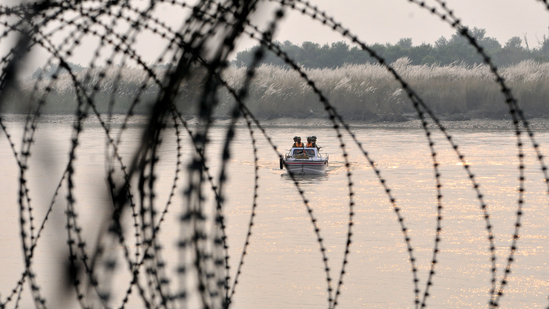Four days after announcing a ceasefire with Pakistan, India once again closed all gates of the Baglihar Hydropower Station on the morning of Wednesday, drying up the downstream channel of the Jhelum River in Pakistan. This unilateral action follows a series of water manipulation since this start of this month: on May 4, India first shut the gates, causing water levels in Pakistan‑administered Kashmir to plummet by three meters and threatening 27,000 hectares of farmland with crop failure. On May 8, India briefly released water under the pretext of “heavy rainfall,” only to resume the shutdown again four days later.
On April 23, India announced its suspension of the Indus Waters Treaty (IWT), a landmark accord brokered by the World Bank in 1960. The treaty assigns control of the “western” rivers (the Indus, Jhelum, and Chenab) to Pakistan and the “eastern” rivers (the Ravi, Beas, and Sutlej) to India, establishing stringent rules for water sharing, data exchange, and dispute resolution. For more than sixty years, the IWT endured three wars between the two countries and was lauded by observers—including a former U.S. President —as “one bright spot” in an otherwise conflict‑prone region. Its robust framework of a permanent Indus Commission and neutral arbitration mechanisms effectively insulated water cooperation from politics.
India has attempted to justify its suspension of the treaty by alleging Pakistani support for terrorism, yet it has offered no evidence and has refused any neutral, third-party investigation. As Ambassador Zamir Akram, Advisor to Pakistan’s Strategic Plans Division, pointed out, “The Indus Waters Treaty is being employed as leverage to force Pakistan into concessions on broader Kashmir disputes.”
By violating its obligations under the IWT and the Vienna Convention on the Law of Treaties, India jeopardizes its international reputation and erodes the very trust and transparency on which treaties depend. As Mr. Akram observed, “There is no clause in the treaty allowing it to be held in abeyance or rejected; it is perpetual and prohibits any structure that would stop or regulate the flow so as to cause drought or flooding in Pakistan.”
Nor will this political maneuver resolve India’s water scarcity. Unlike large storage reservoirs, most of India’s existing hydropower projects on the western rivers are run-of-the-river dams with virtually no capacity to store water.
The root causes of India’s water crisis lie elsewhere: rain-fed agriculture, rampant groundwater depletion, and outdated infrastructure. Over-extraction for irrigation and drinking water has severely depleted groundwater reserves, especially in Punjab, Haryana, and Tamil Nadu. Traditional, water-intensive irrigation methods and policy misalignments further exacerbate the problem, while industrial effluents, untreated sewage, and agricultural runoff render over 70% of surface water unfit for use. Climate change has altered rainfall patterns, causing both droughts and floods, and rapid urbanization in cities like Chennai and Bengaluru has intensified competition for scarce water supplies.
In short, using the IWT’s suspension as a distraction will only punish ordinary farmers on both sides of the border. Beyond human suffering, the ecological damage could be profound: the Indus River sustains critical wetlands, fisheries, and biodiversity across otherwise arid plains. Turning off the taps undermines food security nationwide and risks inflaming a regional crisis from which India cannot remain insulated.
According to Mr. Akram, considering the scale of the dams and canals India would need to build to materially stop Indus flows, any complete cut-off would take at least five to seven years. Meanwhile, Pakistan has vowed to pursue all available legal avenues.
“We have raised the matter in the UN Security Council and will take it to the International Court of Justice. We also reserve the right to seek arbitration by an international authority. We will exhaust all legal options,” Mr. Akram said.
“Ultimately,” he concluded, “India must be prepared to engage with us and address each other’s concerns without undermining its basic commitment under the Indus Waters Treaty to supply a defined annual water allocation. That commitment is non-negotiable.”
Muhammad Zamir Assadi

